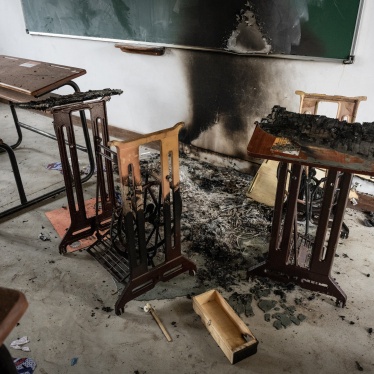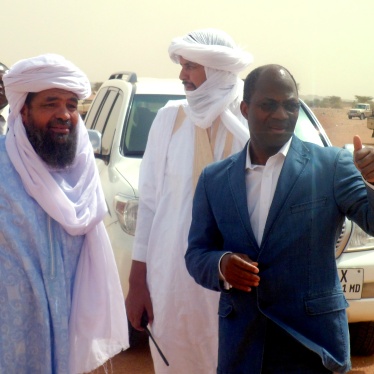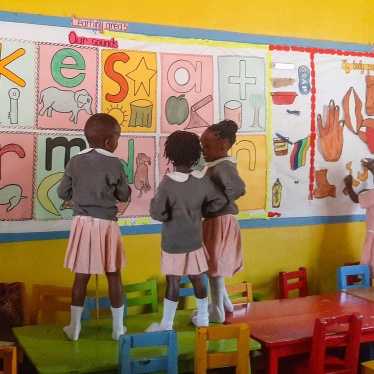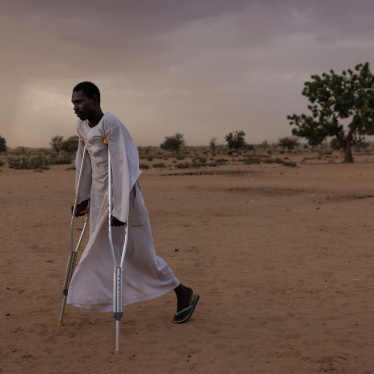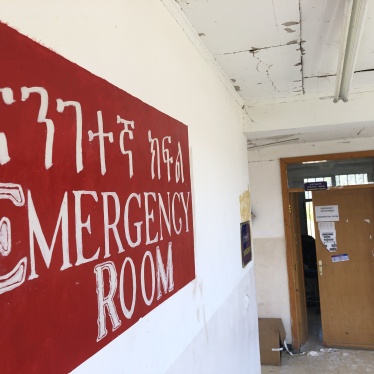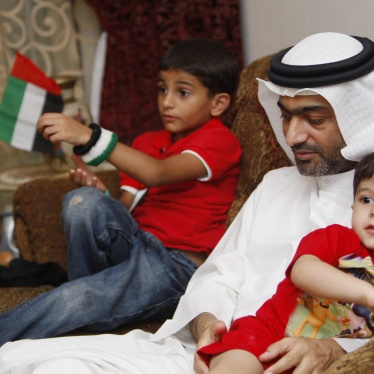His Excellency Olusegun Obasanjo
President of Nigeria
Chairman of the African Union
Your Excellency:
Human Rights Watch welcomes the important initiative that the Nigerian government and, through your direct leadership, the African Union has taken to bring peace and security to Darfur, Sudan. We commend the willingness of the African Union to address the grave problems in Darfur particularly the plight of the 1.6 million displaced persons and the vast destruction of homes and livelihoods in Darfur caused by the Sudanese government and its militias who have committed ethnic cleansing and crimes against humanity in Darfur.
The expansion to 3,500 of the African Union Cease Fire Commission (AUCFC) monitors and troops, and the addition of 854 civilian police, could make a great difference in Darfur and improve security for civilians. We urge you to continue your efforts to expand both the numbers and the mandate of these forces.
A rapid deployment of these 3,500 personnel is urgently required so that the African Union can deploy into the remote but troubled rural areas of Darfur. These areas must be made secure as quickly as possible so that displaced persons can voluntarily return to their homes in safety and dignity. We understand that there are still only 900 personnel/monitors and troops on the ground. The African Union should press the European Union, the United States, and others who have contributed to the deployment to make available logistical personnel and other assets as necessary to complete a quick deployment of the entire force of 3,500 A.U. personnel.
We also urge the African Union to ask the Security Council for a clear mandate to protect civilians in Darfur. This mandate and protection are needed now, more than ever, as the fighting and civilian deaths continue to climb. This month the Sudanese government launched a dry-season offensive in Darfur to gain territory prior to negotiations, while the rebels have launched their own attacks. The ceasefire is simply not being respected by any party to the conflict, with disastrous results for civilians.
With regard to the African Union’s important role of mediating a peace agreement between the Sudanese government and two Darfurian rebel groups, we consider it critical that the African Union insist on human rights provisions in the final agreement. Failure to include in the north-south Naivasha accords any human rights accountability for past abuses, or any monitored enforcement for human rights going forward, undoubtedly gave the Sudanese government assurance of impunity for its abuses in the south—and contributed to its abuses in Darfur. The Sudanese government used the same modus operandi in Darfur as in the south of Sudan to deal with rebellion: creation, arming and use of
ethnic militias, forced displacement of hundreds of thousands of civilians, “scorched earth” tactics, and banning all international humanitarian access to the victims for as long as possible. To prevent the spread of these destructive tactics and further inflammation of ethnic tensions in Sudan, it is imperative to insist on human rights accountability in any Darfur peace agreement.
To set the stage for this key provision in the peace agreement, the African Union should cooperate closely with the U.N. Office of the High Commissioner for Human Rights (OHCHR) and the planned fifty human rights monitors in Darfur. We suggest that the OHCHR accompany the AUCFC in its investigations into ceasefire violations to assure that the relevant human rights findings are included in the AUCFC conclusions.
We urge you also to:
- Expand the numbers of locations where the A.U. troops are based in Darfur. A.U. bases should be increased to at least twenty-four locations or triple the number now targeted of eight for each state inside Darfur, including the more unstable areas where civilians still live--in displaced persons camps and in rural areas—and conduct wide-ranging patrols in civilian-populated zones where fighting appears imminent.
- Devise and impose sanctions, such as depriving the Sudanese government of the right to vote in the African Union, as a penalty for this government’s continued refusal to comply with several A.U.-mediated agreements it has signed, including agreements to:
- refrain “from conducting hostile military flights in and over the Darfur Region” (Protocol on the Enhancement of the Security Situation in Darfur in Accordance with the N’djamena Agreement of November 9); the government used two helicopters and one Antonov airplane in an attack on Adwa, South Darfur, on November 30, 2004; and
- “expeditiously implement its stated commitment to neutralize and disarm the Janjaweed/armed militias, bearing in mind the relevant U.N. Security Council resolutions.” (Protocol on the Enhancement of the Security Situation in Darfur in Accordance with the N’djamena Agreement of November 9). Such a process shall be supervised and verified by the CFC/African Union Mission in Sudan (AMIS). “For this purpose, the Sudanese government shall provide all relevant information to the CFC/AMIS.” (ibid.). The government has promised to “identify and declare those militias over whom it has influence, and provide CFC/AMIS with all relevant details,” and to “ensure that these militias will refrain from all attacks, harassment, or intimidation.” (ibid.) The Sudanese government has not complied with any of these commitments to date.
- Post monitors at barracks, camps, and offices of the Janjaweed militia and the several different security services they have joined, including the Popular Defense Forces, the police, the Border Intelligence Service, and other units, as an initial step in the disarmament of these abusive forces. If the Sudanese government continues to refuse or neglect to disarm these forces, even after sanctions as described above, we urge the African Union to undertake this disarmament.
- Work to assure a reasonable, coordinated plan for security that will permit civilians to return voluntarily to their places of origin, drawing on the experience of the U.N. High Commissioner for Refugees (UNHCR) and International Committee of the Red Cross (ICRC) in other countries and on the U.N. Guiding Principles on Internal Displacement. Measures taken by the government of Sudan to create “safe areas” must not contribute to the prolongation of displacement or be a pretext for the permanent resettlement of the displaced away from their areas of origin. The government’s forcible and unilateral removal of displaced from their temporary locations must be stopped by the African Union.
In no event should the A.U. continue its plans to hold its 5th Assembly of Heads of State and Government in Khartoum in July 2005, and for Sudan to assume the presidency of the A.U. and consequently of the whole of Africa throughout the period July 2005–July 2006. Now is the time to change these plans, as a warning to Sudan that it will not retain its standing in the African Union as long as the crisis in Darfur persists.
Planning to convene the 5th Assembly in Khartoum and to permit Sudan to hold the presidency for one year while the situation in Darfur remains unresolved sends a terrible message to the world about the African Union’s ability and determination to end this crisis. It would undermine the principles and ideals embodied in the A.U. Constitutive Act, as ethnic cleansing, war crimes, and crimes against humanity are still being committed or consolidated in Darfur. Unless the government of Sudan immediately and fully complies with the resolutions of all relevant A.U. and U.N. bodies, you should urge the A.U. Assembly to reverse the decision to hold the July 2005 Assembly in Khartoum when it convenes its next ordinary session in Abuja in January 2005.
The credibility of the African Union is on the line in this important undertaking. The fate of the people of Darfur rests, by international consensus, on the shoulders of the African Union, which has shown the most willingness to protect the victims in Darfur. We urge you to proceed with all the necessary steps required to ensure this protection.
Sincerely,
Peter Takirambudde
Executive Director of the Africa division
Kenneth Roth
Executive Director of Human Rights Watch
